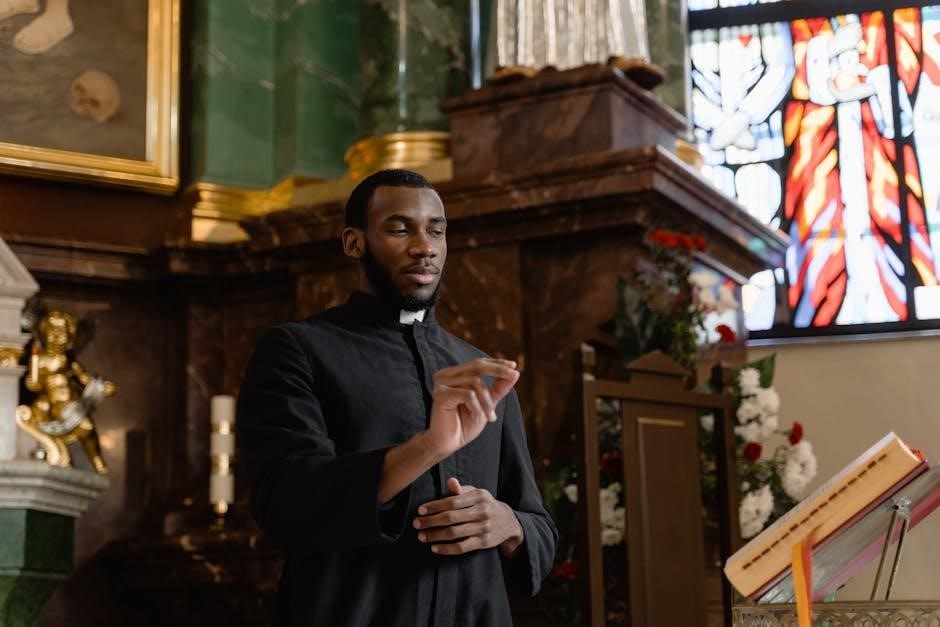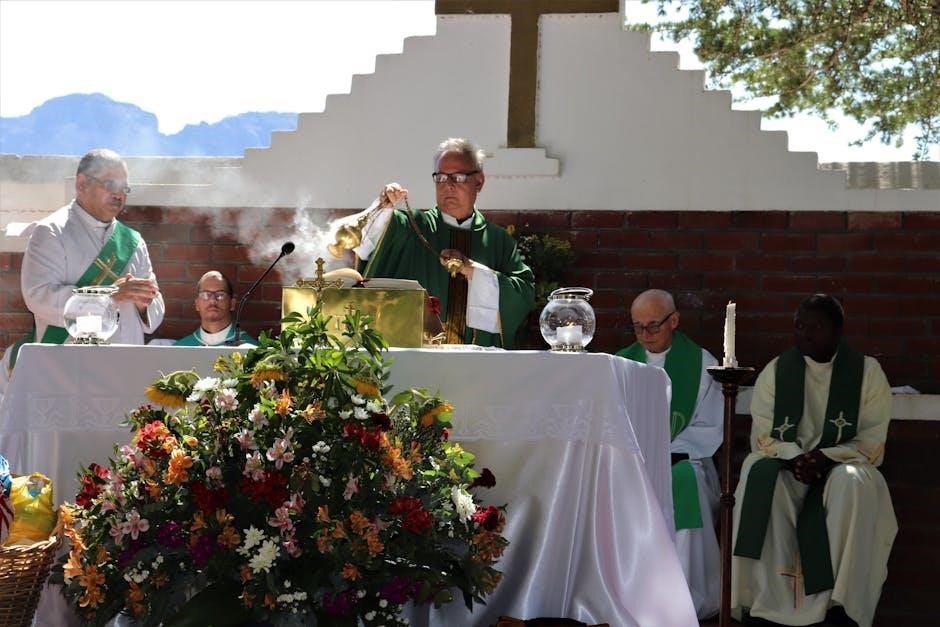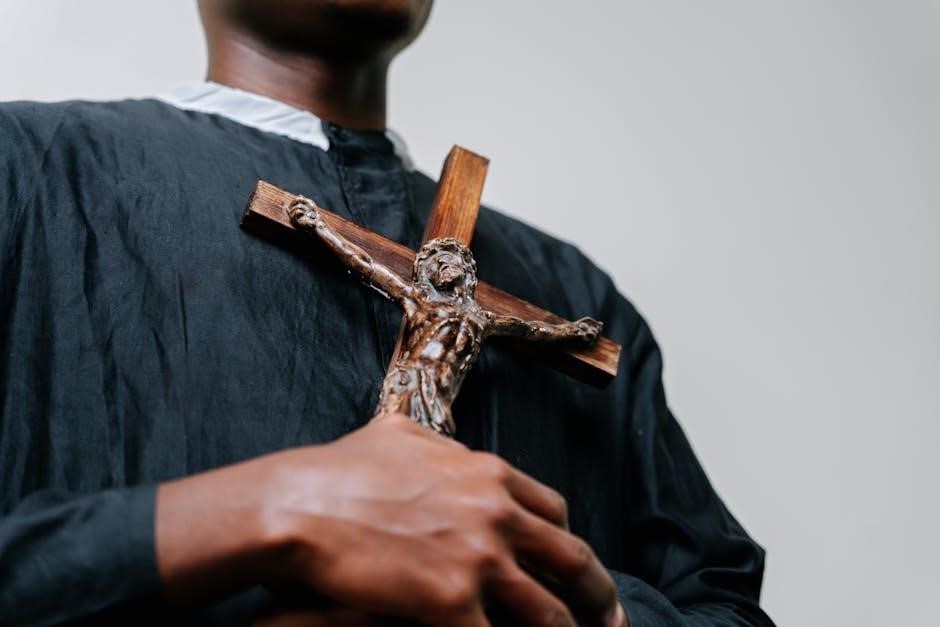
deacons pdf
Deacons are ordained servants and leaders in the church, promoting harmony, unity, and service. They work closely with elders and pastors, focusing on governance, resource management, and community care.
1.1 Biblical Origins and Historical Background
The role of deacons originates in Acts 6:1-6, where the apostles appointed seven men to care for widows and manage practical needs; This allowed apostles to focus on prayer and teaching. The term “deacon” comes from the Greek word for “servant,” reflecting their ministry of service and compassion. Historically, deacons have evolved to support church governance and community care while maintaining their biblical mandate.
1.2 The Role of Deacons in Modern Churches
Today, deacons serve as active ministers, promoting harmony and addressing practical needs within the church. They often manage finances, assist in outreach, and provide spiritual guidance. Deacons collaborate with elders and pastors, ensuring effective governance and care for the congregation. Their role balances administrative responsibilities with compassionate service, fostering unity and supporting the church’s mission to serve both members and the community.

Biblical and Historical Background
Deacons trace their origins to Acts 6, addressing practical needs and fostering unity. Their role has evolved over centuries, adapting to serve churches while maintaining biblical roots.
2.1 The Establishment of Deacons in Acts 6
In Acts 6, the early church faced a crisis as widows were neglected in daily distributions. To address this, the apostles appointed seven men of good reputation to oversee practical needs, ensuring fairness and care. This marked the establishment of deacons, creating a structured ministry focused on service and unity, allowing apostles to concentrate on spiritual leadership and prayer.
2.2 The Evolution of the Deacon Ministry Over Centuries
From their origins in Acts 6, deacons’ roles evolved to encompass varied ministries, including outreach, compassion, and church governance. Over centuries, their responsibilities expanded beyond practical care to spiritual guidance. In some traditions, deacons became ordained clergy, while others maintained their role as servant-leaders. Their adaptability ensured continued relevance, balancing traditional service with emerging church needs across different denominations and cultural contexts.

Qualifications and Characteristics
Deacons must be blameless, the husband of one wife, and of sound faith. They are servant-hearted, showing integrity, humility, and a genuine love for God’s people, reflecting Christ-like character.
3.1 Biblical Qualifications for Deacons
The Bible outlines specific qualifications for deacons in 1 Timothy 3:8-12, emphasizing they must be blameless, the husband of one wife, and of sound faith. They should not be lovers of money, and their lives must reflect integrity, humility, and a genuine love for God’s people. These standards ensure deacons are spiritually fit to serve effectively in their ministry roles.
3.2 Key Traits of Effective Deacons
Effective deacons are servant-hearted, compassionate, and good stewards of church resources. They demonstrate integrity, humility, and a commitment to prayerful leadership. Deacons must be approachable, wise, and skilled in addressing the needs of the congregation. Their ministry is marked by a blend of spiritual sensitivity and practical wisdom, enabling them to serve the church family effectively while fostering unity and harmony.

Ministry of Service
Deacons serve the church family and community through compassionate outreach, caring for the needy, and addressing practical needs, reflecting Christ’s servant-hearted ministry to all people.
4.1 Serving the Needy and the Church Family
Deacons are called to serve the needy and the church family through compassionate outreach, addressing practical needs, and fostering unity. They act as problem solvers, promoting harmony and cooperation among members. Their ministry includes visiting the sick, aiding widows, and ensuring the church family’s well-being, reflecting Christ’s servant-hearted example to all people in need.
4.2 Practical Aspects of Deacon Ministry
Practical aspects of deacon ministry involve managing church funds, preparing budgets, and overseeing administrative tasks. Deacons also assist in ceremonies, visit the sick, and care for widows. They collaborate with pastors and elders to address community needs, ensuring resources are used effectively. Their role includes both financial stewardship and hands-on service, supporting the church’s mission and fostering a spirit of compassion and unity among members.

Relationship Between Deacons and Church Membership
Deacons serve as servant leaders, promoting harmony and addressing members’ needs. They act as problem solvers, ensuring unity and fostering cooperation within the church family.
5.1 Promoting Harmony and Unity
Deacons play a vital role in fostering harmony within the church by addressing conflicts and ensuring unity. They serve as problem solvers, mediating disputes and promoting a spirit of cooperation. By prioritizing the needs of the congregation, deacons help maintain peace and togetherness, ensuring the church family remains united in purpose and fellowship. Their ministry emphasizes servant leadership and mutual support.
5.2 Deacons as Servant Leaders
Deacons exemplify servant leadership by humbly serving the church family. They prioritize the needs of others, fostering a culture of compassion and support. Through acts of service, prayer, and guidance, deacons lead by example, demonstrating Christ-like humility. Their role is not about authority but about equipping and empowering the congregation, ensuring the church thrives in unity and purpose.

Leadership and Collaboration
Deacons collaborate with elders and pastors, supporting spiritual and administrative tasks. Their leadership fosters unity, ensuring effective church governance and service to the congregation.
6.1 Working with Elders and Pastors
Deacons collaborate closely with elders and pastors, supporting spiritual and administrative tasks. They ensure the practical needs of the congregation are met, allowing elders to focus on teaching and prayer. Deacons act as a bridge between the leadership and the church family, facilitating communication and addressing member needs effectively.

6.2 Deacons’ Role in Church Governance
Deacons play a vital role in church governance, managing funds and resources effectively. They collaborate with elders and pastors to ensure the church’s operational needs are met, preparing budgets and overseeing financial planning. Deacons also serve as advisors, providing insights on member needs and community outreach, ensuring decisions align with the church’s mission and values.

Financial and Administrative Responsibilities
Deacons manage church funds, prepare budgets, and oversee financial planning, ensuring resources are used effectively to support ministry and community needs.
7.1 Managing Church Funds and Resources
Deacons oversee the preparation and submission of budgets to finance committees, ensuring resources align with church goals. They manage funds responsibly, maintaining transparency and accountability in financial dealings to support ministry efforts effectively.
7.2 Budgeting and Financial Planning
Deacons collaborate with finance committees to prepare and review annual budgets, ensuring alignment with church objectives. They prioritize resource allocation for ministries, community outreach, and operational needs, fostering financial accountability and transparency. Regular reviews and adjustments are made to optimize stewardship and ensure funds are used effectively to support the church’s mission and vision.

Spiritual Growth and Development
Deacons promote spiritual growth through prayer, guidance, and fostering a culture of discipleship. They encourage believers to deepen their faith and walk with Christ.
8.1 Prayer and Spiritual Guidance
Deacons play a vital role in fostering spiritual growth through prayer and guidance. They serve as prayer partners for the congregation, offering intercession and encouragement. By providing spiritual direction, deacons help individuals and families deepen their faith and navigate life’s challenges; Their ministry emphasizes prayerful support, equipping believers for a stronger walk with Christ, and fostering a culture of discipleship within the church.
8.2 Discipleship and Mentorship
Deacons are instrumental in fostering discipleship and mentorship within the church. They guide individuals in spiritual growth, equipping them for ministry and service. By modeling Christ-like behavior, deacons mentor believers, helping them navigate faith challenges and deepen their relationship with God. This role emphasizes hands-on leadership, encouraging personal development and faith application in daily life, while nurturing a culture of discipleship and accountability.
9.1 Summary of Key Points
Deacons are ordained servants, focusing on ministry, governance, and care. They promote harmony, support elders, and manage resources. Their roles include serving the needy, fostering unity, and ensuring effective church administration. Key traits include compassion, integrity, and a servant-hearted approach. Their ministry complements pastoral leadership, ensuring holistic church growth and community impact through prayer, outreach, and discipleship.
9.2 Recommended Reading and PDF Resources
Key resources include The New Testament Deacon Minister of Mercy by Alexander Strauch and The Deacon Ministry Handbook. The National Directory for Permanent Deacons and PDF guides from Firebrand Church and Cornerstone Church provide practical insights. These materials offer biblical foundations, historical context, and modern applications for deacon ministry, available on church websites and official denominational directories.